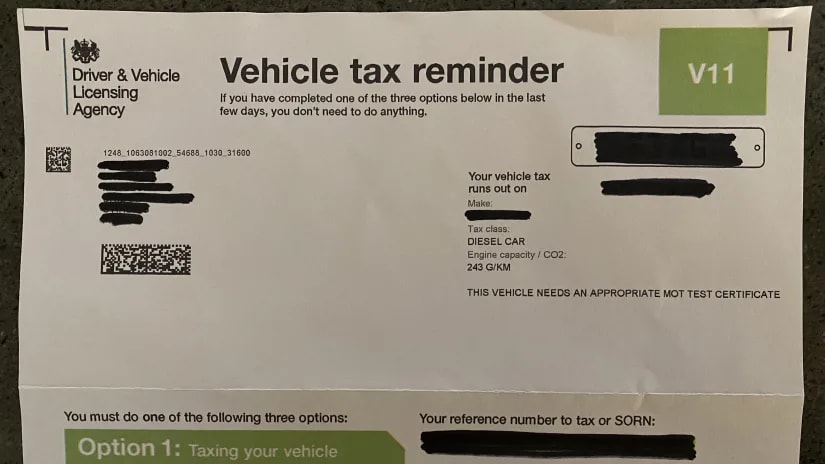
How to get exemption from VED
Vehicle Excise Duty (VED) rates in the UK are set to increase from April 1, 2024. This increase applies to various types of vehicles, including cars, vans, and motorcycles. The VED rates will be uprated in line with the Retail Prices Index (RPI), a standard measure used for adjusting prices based on inflation. This means the actual increase in VED will depend on the RPI at the time of the change.
The first-year car tax rates are experiencing a notable rise, approximately 10%, varying according to the CO2 emissions of the vehicle. For instance, the highest-emitting vehicles, those emitting over 255g/km of CO2, will see their first-year rate increase to £2,745 from the current £2,605. This pattern is consistent across different bands, with each band reflecting a specific range of CO2 emissions. The standard VED rate, applicable from the second year onwards, is also set to increase from £165 to £180 for most cars.
Additionally, there is a so-called ‘luxury’ car tax rate for vehicles that cost more than £40,000 when new. This rate has increased from £335 to £390 as of April 1, 2023, and must be paid each year on top of the standard VED rate for five years from the second year of registration.
These changes are part of the government’s measure to ensure that VED receipts are maintained in real terms and that motorists contribute fairly to public finances. It’s important for vehicle owners to be aware of these changes to understand how they might impact their annual vehicle expenses.
However it's not all bad news as there are several circumstances under which a vehicle can be exempt from VED:
1. Zero Emissions: Vehicles that produce zero CO2 emissions and have a list price of less than £40,000 are exempt from VED. This typically includes electric vehicles.
2. Disabled Users: If you’re a disabled driver, you might be exempt from paying VED. This includes vehicles used by a disabled person or institutions providing transport for disabled people.
3. Historic Vehicles: Vehicles over 40 years old are exempt from VED. To qualify for this exemption, the vehicle must be registered with the DVLA as a ‘historic vehicle’.
4. Electric Vehicles: As mentioned, fully electric vehicles (EVs) are usually exempt from VED, regardless of their price, if they produce zero emissions.
5. Mobility Scooters and Powered Wheelchairs: These are exempt from VED.
6. Agricultural, Horticultural, and Forestry Vehicles: Specialised vehicles used for agriculture, horticulture, and forestry purposes are exempt from VED.
To gain an exemption, you typically need to apply through the Driver and Vehicle Licensing Agency (DVLA) in the UK. The process and documentation required will depend on the basis for the exemption. For example, for a historic vehicle, you would need to prove the age of the vehicle. For a disability exemption, you would need documentation proving the disability and how it qualifies you for exemption.
About CarsVansandBikes.com
CarsVansandBikes.com: Revolutionizing Vehicle Advertising in the Digital Age
In the ever-evolving digital landscape, the quest for the perfect vehicle - be it a car, van, or motorbike - has been transformed by the emergence of CarsVansandBikes.com. Launched in 2021, this digital advertising website has rapidly become the go-to platform for motorists seeking new or pre-owned vehicles. Embodying the ethos As easy as CVB, the platform simplifies the search process, making it more accessible and user-friendly.
What sets CarsVansandBikes.com apart in the crowded online marketplace is its commitment to unbiased advertising. In a marked departure from industry norms, CVB eschews advertising or sponsored listings. This principled stance ensures that all vehicles are presented on CarsVansandBikes.com without any undue influence or bias, offering a refreshingly transparent experience for users. This approach starkly contrasts with other platforms where sponsored listings can often skew visibility and influence consumer choice.
The fair and transparent cataloging of advertising stock on CarsVansandBikes.com is another cornerstone of its service. By providing comprehensive details of each vehicle, beyond just listing prices, the platform empowers motorists to make well-informed decisions. This depth of information is crucial in an industry where the nuances of each vehicle can significantly impact buyer satisfaction.
A standout feature of CarsVansandBikes.com is its pricing model. When it first graced the online automotive advertising scene, CVB distinguished itself by not charging extra fees. In a bold move for 2024, the platform has further elevated its commitment to affordability. Now, neither motor dealers nor private motorists are required to pay to advertise their vehicles on the site. This initiative is a significant stride in democratizing vehicle advertising, allowing sellers of all scales to reach potential customers without financial barriers.
The platform's ethos of connecting sellers directly with potential buyers is a testament to its user-centric design. CarsVansandBikes.com goes beyond mere transactional interactions, fostering a community where detailed vehicle information is readily available. This approach not only aids in the selling process but also ensures that buyers are better equipped to make choices that align with their needs and expectations.
Operating under the trade name CarsVansandBikes.com, CarsVansandBikes Limited has positioned itself as a trailblazer in the automotive advertising industry. By offering its services completely free of charge, the platform breaks down traditional barriers, making vehicle advertising more accessible and equitable.
As CarsVansandBikes.com continues to grow and evolve, its impact on the automotive market is undeniable. With its user-friendly interface, commitment to unbiased advertising, and innovative approach to cost, CVB is not just a platform; it's a paradigm shift in how we find and advertise vehicles in the digital age.